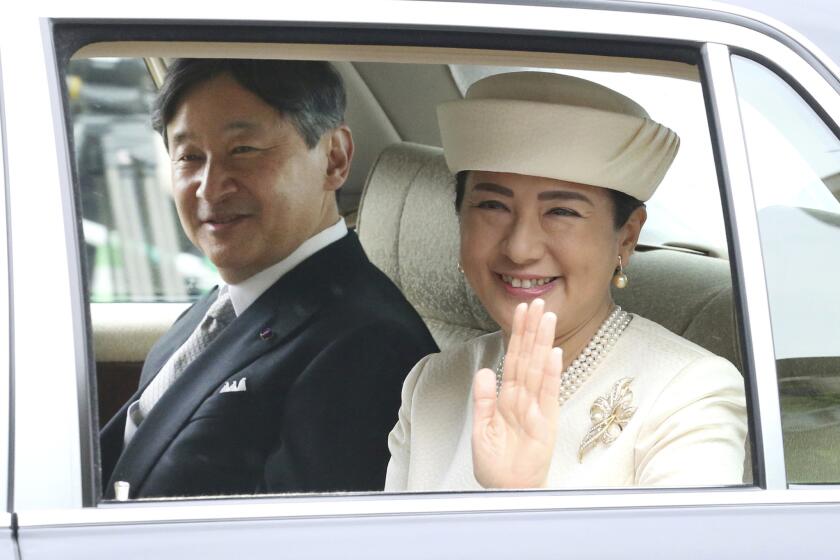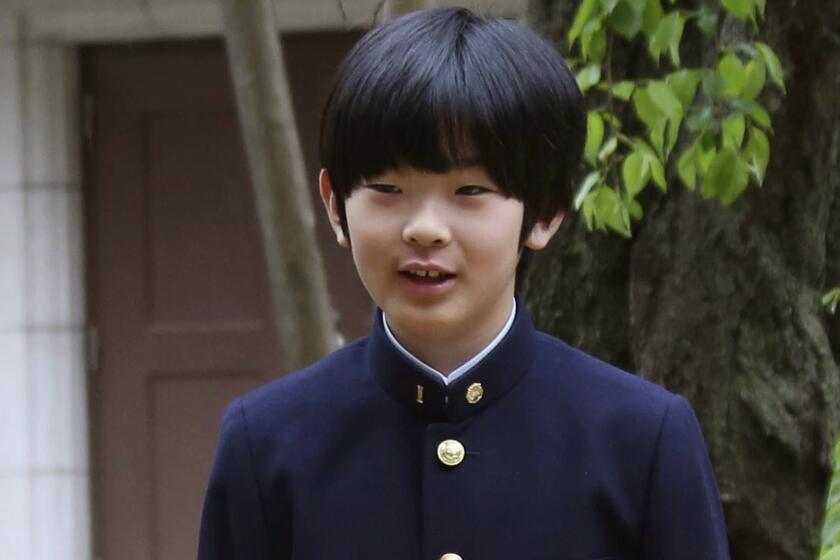Skipping daughter, Japan emperor declares brother to be first in line to throne

TOKYO — Japanese Emperor Naruhito’s younger brother, Crown Prince Fumihito, was formally sworn in as first in line to the Chrysanthemum Throne in a traditional palace ritual that had been postponed for seven months and scaled down because of the COVID-19 pandemic.
The ceremony Sunday for the 54-year-old crown prince, better known as Prince Akishino, concluded a series of imperial succession rituals that began in May last year when Naruhito ascended to the throne after their 86-year-old father, Akihito, abdicated.
Inside the palace’s most prestigious chamber, the Pine Room, Naruhito, 60, officially declared his younger brother to be the crown prince who is first in line to accede to the throne of the world’s oldest monarchy.
“I hereby declare in and outside of the country that Prince Fumihito is now the crown prince,” said Naruhito, in his reddish-brown robe and a headdress.
Fumihito, in an orange robe and accompanied by his wife, Crown Princess Kiko, pledged in response: “I deeply acknowledge my responsibilities as crown prince and carry out my duties.”
The ceremony, which lasted about 15 minutes, was initially scheduled for April 19. It was postponed after Japan’s government declared a state of emergency earlier that month because of the coronavirus.
Japan’s imperial palace has a new resident who earned an economics degree from Harvard, speaks at least five languages and has negotiated complicated trade deals as a diplomat.
About 50 people instead of the originally expected 350 attended the ceremony, including Prime Minister Yoshihide Suga and other top government officials, as well as prefectural representatives and selected foreign dignitaries.
In a separate, closed-door ceremony later Sunday, Fumihito inherited an imperial sword symbolizing his status as crown prince.
Palace banquets and other events, including the public signing of congratulatory messages, have been canceled as part of anti-virus measures.
Sunday’s proclamation for the crown prince paves the way for the government to start discussing what to do about the dire shortage of male heirs.
Princess Kiko gives birth to the first male heir in 40 years. He is third in line to the throne.
Naruhito’s succession left only two younger men in line for the throne: Fumihito and his 14-year-old son, Hisahito. Naruhito’s 18-year-old daughter, Aiko, and the crown prince’s two daughters, Mako and Kako, are not in line because they are women.
Japan’s Imperial House Law, largely based on the country’s prewar constitution, does not allow a female emperor and strips women of royal status if they marry commoners.
The government in 2005 considered the possibility of female emperors, but the discussion halted as soon as Hisahito was born the following year. Surveys have shown that most Japanese support having a female emperor, as Aiko has become increasingly popular.
Suga recently said his government would begin studying ways to secure a stable imperial succession after the crown prince’s proclamation.
News Alerts
Get breaking news, investigations, analysis and more signature journalism from the Los Angeles Times in your inbox.
You may occasionally receive promotional content from the Los Angeles Times.
Official duties increased during the reign of hugely popular former Emperor Akihito, who interacted with the public, including visiting disaster-hit areas to console residents.
Fumihito, one of the more outspoken members of the imperial family, has expressed his views on how the family should adapt to modern times. He has said he believed royal duties could be shared equally regardless of gender, though he declined to comment on whether female emperors should be allowed.
The imperial family currently has 13 women, including six who could marry and lose their royal status in coming years.
More to Read
Sign up for Essential California
The most important California stories and recommendations in your inbox every morning.
You may occasionally receive promotional content from the Los Angeles Times.












